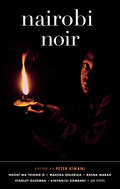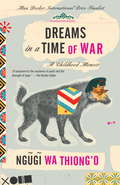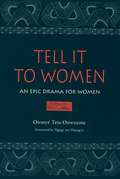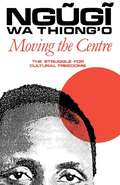Title search results
Showing 1 - 17 of 17 items

Nairobi Noir (Akashic Noir)
By Ngugi Wa Thiong'O, Makena Onjerika, Rasna Warah, Stanley Gazemba, Kinyanjui Kombani. 2020
In this anthology, fourteen authors explore dark mysteries in the concrete jungle capital of Kenya, dealing with topics of race,…
religion, and corruption.Akashic Books continues its award-winning series of original noir anthologies, launched in 2004 with Brooklyn Noir. Each book comprises all-new stories, each one set in a distinct neighborhood or location within the respective city.Brand-new stories by: Ngugi wa Thiong’o, Stanley Gazemba, Ngumi Kibera, Peter Kimani, Winfred Kiunga, Kinyanjui Kombani, Caroline Mose, Kevin Mwachiro, Wanjiku wa Ngugi, Faith Oneya, Makena Onjerika, Troy Onyango, J.E. Sibi-Okumu, and Rasna Warah.Praise for Nairobi Noir“Nairobi Noir takes readers into the enigmas that haunt Kenya’s most populous city through the deft storytelling of a stellar cast of writers, which includes Ngugi wa Thiong’o, Stanley Gazemba, Makena Onjerika, Troy Onyango, and others.” —Brittle Paper, One of 50 Notable African Books of 2020“Nairobi is a city of 3 million souls, so it makes sense as a setting Akashic Books’ famed noir series. 14 new stories fill a collection with Nairobi old and new; authors range in age from 24 to 81, and many layers of the city and its complex subcultures will be revealed as the reader makes their way through. Perfect for the armchair traveler!” —CrimeReads, included in CrimeReads’ Most Anticipated Crime Books of 2020“Crime fiction fans have much to savor.” —Publishers Weekly
The River Between
By Ngugi Wa Thiong'O. 1965
The River Between explores life on the Makuyu and Kameno ridges of Kenya in the early days of white settlement.…
Faced with an alluring new religion and 'magical' customs, the Gikuyu people are torn between those who fear the unknown and those who see beyond it.
Writers in Politics (Studies in African Literature)
By Ngugi Wa Thiong'O. 1997

To Stir the Heart: Four African Stories
By Ngugi Wa Thiong'O, Bessie Head. 2007
From origin myths to tales of modern prostitutes in search of dignity--even for only a moment--these powerful stories by two…
renowned African authors explore the uneasy coexistence between women and men, tradition and modernity. They show strong women demanding their right to marry or not, earn a living, and most importantly, be respected. South African-bornBessie Head (1937-1986) immigrated to Botswana, where she is considered their most important writer. Ngugi wa Thiong'o is a major Kenyan writer now living in the United States. He teaches and directs an international writing center at the University of California, Irvine.
Dreams in a Time of War: A Childhood Memoir
By Ngugi Wa Thiong'O. 2010
Man Booker International Prize Finalist • By the world-renowned novelist, playwright, critic, and author of Wizard of the Crow, an…
evocative and affecting memoir of childhood.&“A testament to the resilience of youth and the strength of hope."—The Boston GlobeBorn in 1938 in rural Kenya, Ngũgĩ wa Thiong&’o came of age in the shadow of World War II, amidst the terrible bloodshed in the war between the Mau Mau and the British. The son of a man whose four wives bore him more than a score of children, young Ngũgĩ displayed what was then considered a bizarre thirst for learning, yet it was unimaginable that he would grow up to become a world-renowned novelist, playwright, and critic.In Dreams in a Time of War, Ngũgĩ deftly etches a bygone era, bearing witness to the social and political vicissitudes of life under colonialism and war. Speaking to the human right to dream even in the worst of times, this rich memoir of an African childhood abounds in delicate and powerful subtleties and complexities that are movingly told.
Globalectics
By Ngugi Wa Thiong'O. 2012
A masterful writer working in many genres, Ngugi wa Thiong'o entered the East African literary scene in 1962 with the…
performance of his first major play, The Black Hermit, at the National Theatre in Uganda. In 1977 he was imprisoned after his most controversial work, Ngaahika Ndeenda (I Will Marry When I Want), produced in Nairobi, sharply criticized the injustices of Kenyan society and unequivocally championed the causes of ordinary citizens. Following his release, Ngugi decided to write only in his native Gikuyu, communicating with Kenyans in one of the many languages of their daily lives, and today he is known as one of the most outspoken intellectuals working in postcolonial theory and the global postcolonial movement.In this volume, Ngugi wa Thiong'o summarizes and develops a cross-section of the issues he has grappled with in his work, which deploys a strategy of imagery, language, folklore, and character to "decolonize the mind." Ngugi confronts the politics of language in African writing; the problem of linguistic imperialism and literature's ability to resist it; the difficult balance between orality, or "orature," and writing, or "literature"; the tension between national and world literature; and the role of the literary curriculum in both reaffirming and undermining the dominance of the Western canon. Throughout, he engages a range of philosophers and theorists writing on power and postcolonial creativity, including Hegel, Marx, Lévi-Strauss, and Aimé Césaire. Yet his explorations remain grounded in his own experiences with literature (and orature) and reworks the difficult dialectics of theory into richly evocative prose.
Down Second Avenue
By Ngugi Wa Thiong'O, Es'Kia Mphahlele. 1959
Es kia Mphahlele s seminal memoir of life in apartheid South Africa--available for the first time in Penguin Classics …
Nominated for the Nobel Prize in 1969 Es kia Mphahlele is considered the Dean of African Letters and the father of black South African writing Down Second Avenue is a landmark book that describes Mphahlele s experience growing up in segregated South Africa Vivid graceful and unapologetic it details a daily life of severe poverty and brutal police surveillance under the subjugation of an apartheid regime Banned in South Africa after its original 1959 publication for its protest against apartheid Down Second Avenue is a foundational work of literature that continues to inspire activists today
Birth of a Dream Weaver: A Writer's Awakening
By Ngugi Wa Thiong'O. 2016
Birth of a Dream Weaver charts the very beginnings of a writer's creative output. In this wonderful memoir, Kenyan writer…
Ngugi wa Thiong'o recounts the four years he spent in Makerere University in Kampala, Uganda--threshold years where he found his voice as a playwright, journalist, and novelist, just as Uganda, Kenya, Congo, and other countries were in the final throes of their independence struggles.James Ngugi, as he was known then, is haunted by the emergency period of the previous decade in Kenya, when his friends and relatives were killed during the Mau Mau Rebellion. He is also haunted by the experience of his childhood in a polygamous family and the brave break his mother made from his father's home. Accompanied by these ghosts, Ngugi begins to weave stories from the fibers of memory, history, and a shockingly vibrant and turbulent present.What unfolds in this moving and thought-provoking memoir is both the birth of one of the most important living writers--lauded for his "epic imagination" (Los Angeles Times)--and the death of one of the most violent episodes in global history.
A Grain of Wheat (Penguin African Writers Series #2)
By Ngugi Wa Thiong'O, Abdulrazak Gurnah. 1986
The best-known novel by the great Kenyan writer Set in the wake of the Mau Mau rebellion and on the…
cusp of Kenya's independence from Britain, A Grain of Wheat follows a group of villagers whose lives have been transformed by the 1952-1960 Emergency. At the center of it all is the reticent Mugo, the village's chosen hero and a man haunted by a terrible secret. As we learn of the villagers' tangled histories in a narrative interwoven with myth and peppered with allusions to real-life leaders, including Jomo Kenyatta, a masterly story unfolds in which compromises are forced, friendships are betrayed, and loves are tested.
Tell It to Women: An Epic Drama for Women
By Ngugi Wa Thiong’o, Osonye Tess Onwueme. 1997
Using the magic of movement, dance, and drama, and the devices of humor and metaphor, Osonye Tess Onwueme has created…
a post-feminist epic drama that transcends current feminist theories. An ideologically and politically powerful work, Tell It to Women offers a critical discourse on the western feminist movement from an African traditional perspective, focusing attention on the often silenced issues of intra-gender politics and class inequities.
The Power of the Steel-tipped Pen: Reconstructing Native Hawaiian Intellectual History
By Ngugi Wa Thiong'O, Noenoe K. Silva. 2017
In The Power of the Steel-tipped Pen Noenoe K. Silva reconstructs the indigenous intellectual history of a culture where—using Western…
standards—none is presumed to exist. Silva examines the work of two lesser-known Hawaiian writers—Joseph Ho‘ona‘auao Kanepu‘u (1824–ca. 1885) and Joseph Moku‘ohai Poepoe (1852–1913)—to show how the rich intellectual history preserved in Hawaiian-language newspapers is key to understanding Native Hawaiian epistemology and ontology. In their newspaper articles, geographical surveys, biographies, historical narratives, translations, literatures, political and economic analyses, and poetic works, Kanepu‘u and Poepoe created a record of Hawaiian cultural history and thought in order to transmit ancestral knowledge to future generations. Celebrating indigenous intellectual agency in the midst of US imperialism, The Power of the Steel-tipped Pen is a call for the further restoration of native Hawaiian intellectual history to help ground contemporary Hawaiian thought, culture, and governance.
Something Torn and New: An African Renaissance
By Ngugi Wa Thiong'O. 2009
Novelist Ngugi wa Thiong'o has been a force in African literature for decades: Since the 1970s, when he gave up…
the English language to commit himself to writing in African languages, his foremost concern has been the critical importance of language to culture. In Something Torn and New, Ngugi explores Africa's historical, economic, and cultural fragmentation by slavery, colonialism, and globalization. Throughout this tragic history, a constant and irrepressible force was Europhonism: the replacement of native names, languages, and identities with European ones. The result was the dismemberment of African memory. Seeking to remember language in order to revitalize it, Ngugi's quest is for wholeness. Wide-ranging, erudite, and hopeful, Something Torn and New is a cri de coeur to save Africa's cultural future.
The River Between (Penguin African Writers Series #4)
By Ngugi Wa Thiong'O, Uzodinma Iweala. 1965
A 50th-anniversary edition of one of the most powerful novels by the great Kenyan author and Nobel Prize contender A…
legendary work of African literature, this moving and eye-opening novel lucidly captures the drama of a people and culture whose world has been overturned. The River Between explores life in the mountains of Kenya during the early days of white settlement. Faced with a choice between an alluring new religion and their own ancestral customs, the Gikuyu people are torn between those who fear the unknown and those who see beyond it.For more than sixty-five years, Penguin has been the leading publisher of classic literature in the English-speaking world. With more than 1,500 titles, Penguin Classics represents a global bookshelf of the best works throughout history and across genres and disciplines. Readers trust the series to provide authoritative texts enhanced by introductions and notes by distinguished scholars and contemporary authors, as well as up-to-date translations by award-winning translators.From the Trade Paperback edition.
Decolonising The Mind: The Politics Of Language In African Literature (Studies In African Literature)
By Kevin O'Connor, Ngugi Wa Thiong'O. 1986
Ngugi describes this book as "a summary of some of the issues in which I have been passionately involved for…
the last twenty years of my practice in fiction, theatre, criticism and in the teaching of literature. In the eighteenth and nineteenth centuries Europe stole art treasures from Africa to decorate their houses and museums; in the twentieth century Europe is stealing the treasures of the mind to enrich their languages and cultures...."
Weep Not, Child
By Ben Okri, Ngugi Wa Thiong'O. 1964
The great Kenyan writer's powerful first novel Two brothers, Njoroge and Kamau, stand on a garbage heap and look…
into their futures: Njoroge is to attend school, while Kamau will train to be a carpenter. But this is Kenya, and the times are against them: In the forests, the Mau Mau is waging war against the white government, and the two brothers and their family need to decide where their loyalties lie. For the practical Kamau, the choice is simple, but for Njoroge the scholar, the dream of progress through learning is a hard one to give up. First published in 1964, Weep Not, Child is a moving novel about the effects of the infamous Mau Mau uprising on the lives of ordinary men and women, and on one family in particular. .
Devil on the Cross
By Chinua Achebe, Ngugi Wa Thiong'O, Namwali Serpell. 2017
The great Kenyan writer and Nobel Prize nominee Ngũgĩ wa Thiong’o’s powerful fictional critique of capitalismOne of the cornerstones of…
Ngũgĩ wa Thiong’o’s fame, Devil on the Cross was written in secret, on toilet paper, while Ngũgĩ was in prison. It tells the tragic story of Wariinga, a young woman who moves from a rural Kenyan town to the capital, Nairobi, only to be exploited by her boss and later by a corrupt businessman. As she struggles to survive, Wariinga begins to realize that her problems are only symptoms of a larger societal malaise and that much of the misfortune stems from the Western, capitalist influences on her country. An impassioned cry for a Kenya free of dictatorship and for African writers to work in their own local dialects, Devil on the Cross has had a profound influence on Africa and on post-colonial African literature.For more than seventy years, Penguin has been the leading publisher of classic literature in the English-speaking world. With more than 1,700 titles, Penguin Classics represents a global bookshelf of the best works throughout history and across genres and disciplines. Readers trust the series to provide authoritative texts enhanced by introductions and notes by distinguished scholars and contemporary authors, as well as up-to-date translations by award-winning translators.
Moving The Centre: The Struggle For Cultural Freedoms
By Ng 361, G 297, Wa Thiong'O. 1993
In this collection Ngugi is concerned with moving the centre in two senses - between nations and within nations -…
in order to contribute to the freeing of world cultures from the restrictive walls of nationalism, class, race and gender Between nations the need is to move the centre from its assumed location in the West to a multiplicity of spheres in all the cultures of the world. Within nations the move should be away from all minority class establishments to the real creative centre among working people in conditions of racial, religious and gender equality.